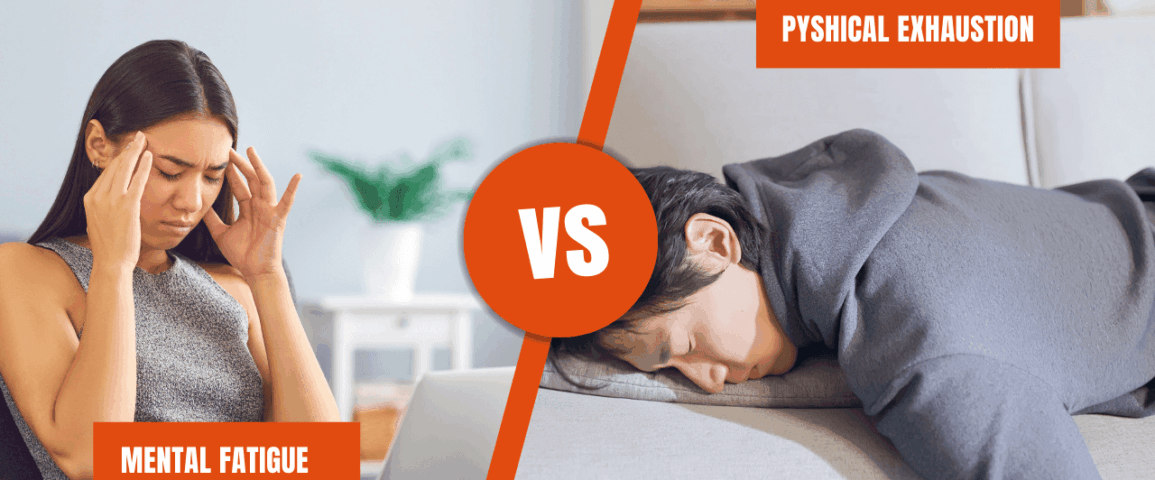Still Tired After Rest? The Real Difference Between Mental Fatigue and Physical Exhaustion
Ritika Lashkari
Ever wake up after a full night’s sleep, no gym session, and maybe even a nap… and still feel like you’re dragging a weighted blanket through your day?
Your body feels heavy.
Your brain? Foggy, scattered, maybe numb.
Your motivation? Flatlined.
You’re not alone—and no, you’re not lazy. You’re likely dealing with something we don’t talk about enough: mental fatigue.
Let’s dive into what that actually means—and why sleep alone won’t fix it.
First Things First: What’s the Difference Between Mental Fatigue and Physical Exhaustion?
Most of us know what physical tiredness feels like—sore muscles, low energy, maybe the desire to melt into the couch after a long day.
But mental fatigue? That’s when your mind is overworked, emotionally overwhelmed, and constantly trying to keep up—without ever really turning off.
| Physical Exhaustion | Mental Fatigue | |
|---|---|---|
| Cause | Overuse of body | Overuse of mind/emotions |
| Solved by | Sleep, food, body rest | Emotional rest, processing |
| Feels like | Muscle soreness, fatigue | Brain fog, numbness, irritability |
| Recovery | Sleep, naps, nutrition | Silence, creativity, boundaries, reflection |

What Causes Mental Fatigue?
Mental fatigue builds up when your brain is constantly absorbing and responding—without getting a break. It’s the result of emotional traffic jams and nonstop mental “to-do” lists.
Common triggers include:
- Chronic stress or anxiety
- Constant multitasking
- Decision fatigue (even small choices wear you down)
- Suppressing emotions
- Social overload
- Caregiving or academic burnout
- Living in “go mode” 24/7
Here’s the catch:
Mental fatigue doesn’t always come from doing too much—it often comes from feeling too much, for too long.
How to Tell If You’re Mentally Fatigued (Not Just Tired)
Let’s keep it real. If you relate to any of these, it’s worth checking in with your emotional energy, not just your sleep schedule:
- You sleep but wake up feeling just as drained
- You can’t concentrate, even on things you enjoy
- You feel distant, detached, or “off” emotionally
- Even small tasks feel overwhelming
- You scroll endlessly but absorb nothing
- You feel guilty for resting—but can’t seem to be productive
- Noises, texts, or social interaction feel overstimulating
This isn’t just tiredness. It’s burnout in disguise.
Why Sleep Isn’t Working (And What to Try Instead)
While growing up, you would have heard a common statement from your caregivers: “Feeling tired? Just take a nap and you’ll start feeling better.” But here’s the truth: You can’t sleep away emotional overwhelm.
If your exhaustion is rooted in mental and emotional overload, you need a different kind of rest.
Here’s what actually helps:
1. A Daily Stimulus Detox
Schedule time in your day for a digital detox. Turn off the podcast. Put your phone down. Step away from screens.
Give your nervous system 10–15 minutes of quiet every day—no music, no talking, no task. Just… space.
Why it works: It stops the input and gives your brain a break from processing.
2. Time to Feel
Just like scheduling international time for digital detox, set time to process your emotions. Whether it’s journaling, venting to a friend, or crying in the car—make time to feel. Your feelings are data, not drama. Mental fatigue is often unprocessed emotion.
Try this: Ask yourself, “What am I actually feeling right now?”—and give yourself permission not to solve it, just notice it.
3. Do One Thing at a Time
Multitasking feels productive but is secretly exhausting your brain.
Try single-tasking:
One screen.
One task.
One small goal at a time.
Let your mind breathe between transitions—it needs that space.
4. Move Gently, Not Rigorously
Mental fatigue isn’t fixed by pushing harder. It’s healed with kindness.
Stretch. Walk. Breathe deeply. Dance if that brings joy.
Move with intention, not obligation.
Your body sends powerful messages to your brain—and gentle movement says, “We’re okay.”
5. Practice boundary setting
Being constantly “on” for others—emotionally, digitally, socially—is draining.
Set clear boundaries:
- Delay your replies
- Log off earlier
- Say no to non-essential plans
- Take space from people who exhaust you
Reminder: You don’t need to be accessible to everyone, all the time.
6. Do Something Just for You (Without Needing It to Be ‘Useful’)
Paint. Cook. Doodle. Garden. Reorganize your bookshelf.
Not for content. Not for results. Just for you.
Unproductive joy is a powerful healer. Creativity restores what structure can’t.
If you’ve ever thought:
“I didn’t even do much today. Why am I this tired?”
“I got enough sleep. What’s wrong with me?”
“I should be more productive…”
Please know this:
You’re not broken. You’re just carrying too much—quietly, invisibly, and constantly.
And now, your brain is asking for what your schedule never gave it: softness, not sleep.
Final thoughts: Mental fatigue doesn’t mean you’ve failed.
It means you’re human in a world that expects you to be a machine. So next time you feel that heaviness settle in—even after a full night’s sleep—don’t reach for another nap or coffee right away.
Ask instead:
“What part of me is actually tired?”
And then give it what it really needs.
- Login
- Sign Up